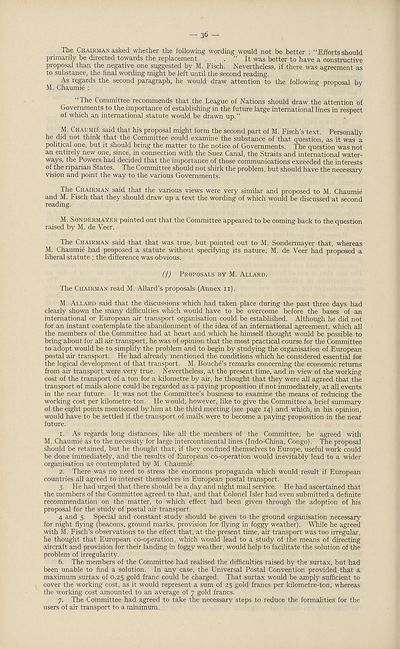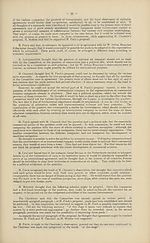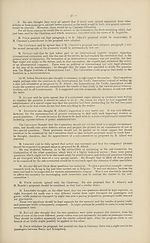Communications and transit > Air transport co-operation committee : minutes of the first session : held at Geneva from July 8th to 12th, 1930
(36)
Download files
Complete book:
Individual page:
Thumbnail gallery: Grid view | List view

— 36 —
The Chairman asked whether the following wording would not be better : “ Efforts should
primarily be directed towards the replacement ...” It was better to have a constructive
proposal than the negative one suggested by M. Fisch. Nevertheless, if there was agreement as
to substance, the final wording might be left until the second reading.
As regards the second paragraph, he would draw attention to the following proposal by
M. Chaumie : '
“The Committee recommends that the League of Nations should draw the attention of
Governments to the importance of establishing in the future large international lines in respect
of which an international statute would be drawn up.”
M. Chaumie said that his proposal might form the second part of M. Fisch’s text. Personally
he did not think that the Committee could examine the substance of that question, as it was a
political one, but it should bring the matter to the notice of Governments. The question was not
an entirely new one, since, in connection with the Suez Canal, the Straits and international water-
ways, the Powers had decided that the importance of those communications exceeded the interests
of the riparian States. The Committee should not shirk the problem, but should have the necessary
vision and point the way to the various Governments.
The Chairman said that the various views were very similar and proposed to M. Chaumie
and M. Fisch that they should draw up a text the wording of which would be discussed at second
reading.
M. Sondermayer pointed out that the Committee appeared to be coming back to the question
raised by M. de Veer.
The Chairman said that that was true, but pointed out to M. Sondermayer that, whereas
M. Chaumie had proposed a statute without specifying its nature, M. de Veer had proposed a
liberal statute ; the difference was obvious.
(f) Proposals by M. Allard.
The Chairman read M. Allard’s proposals (Annex n).
M. Allard said that the discussions which had taken place during the past three days had
clearly shown the many difficulties which would have to be overcome before the bases of an
international or European air transport organisation could be established. Although he did not
for an instant contemplate the abandonment of the idea of an international agreement, which all
the members of the Committee had at heart and which he himself thought would be possible to
bring about for all air transport, he was of opinion that the most practical course for the Committee
to adopt would be to simplify the problem and to begin by studying the organisation of European
postal air transport. He had already mentioned the conditions which he considered essential for
the logical development of that transport. M. Bouche’s remarks concerning the economic returns
from air transport were very true. Nevertheless, at the present time, and in view of the working
cost of the transport of a ton for a kilometre by air, he thought that they were all agreed that the
transport of mails alone could be regarded as a paying proposition if not immediately, at all events
in the near future. It was not the Committee’s business to examine the means of reducing the
working cost per kilometre ton. He would, however, like to give the Committee a brief summary
of the eight points mentioned by him at the third meeting (see page 14) and which, in his opinion,
would have to be settled if the transport of mails were to become a paying proposition in the near
future.
1. As regards long distances, like all the members of the Committee, he agreed with
M. Chaumie as to the necessity for large intercontinental lines (Indo-China, Congo). The proposal
should be retained, but he thought that, if they confined themselves to Europe, useful work could
be done immediately, and the results of European co-operation would inevitably lead to a wider
organisation as contemplated by M. Chaumie.
2. There was no need to stress the enormous propaganda which would result if European
countries all agreed to interest themselves in European postal transport.
3. He had urged that there should be a day and night mail service. He had ascertained that
the members of the Committee agreed to that, and that Colonel Isler had even submitted a definite
recommendation on the matter, to which effect had been given through the adoption of his
proposal for the study of postal air transport.
4 and 5. Special and constant study should be given to the ground organisation necessary
for night flying (beacons, ground marks, provision for flying in foggy weather). While he agreed
with M. Fisch’s observations to the elfect that, at the present time, air transport was too irregular,
he thought that European co-operation, which would lead to a study of the means of directing
aircraft and provision for their landing in foggy weather, would help to facilitate the solution of the
problem of irregularity.
6. The members of the Committee had realised the difficulties raised by the surtax, but had
been unable to find a solution. In any case, the Universal Postal Convention provided that a
maximum surtax of 0.25 gold franc could be charged. That surtax would be amply sufficient to
cover the working cost, as it would represent a sum of 25 gold francs per kilometre-ton, whereas
the working cost amounted to an average of 7 gold francs.
7. The Committee had agreed to take the necessary steps to reduce the formalities for the
users of air transport to a minimum.
The Chairman asked whether the following wording would not be better : “ Efforts should
primarily be directed towards the replacement ...” It was better to have a constructive
proposal than the negative one suggested by M. Fisch. Nevertheless, if there was agreement as
to substance, the final wording might be left until the second reading.
As regards the second paragraph, he would draw attention to the following proposal by
M. Chaumie : '
“The Committee recommends that the League of Nations should draw the attention of
Governments to the importance of establishing in the future large international lines in respect
of which an international statute would be drawn up.”
M. Chaumie said that his proposal might form the second part of M. Fisch’s text. Personally
he did not think that the Committee could examine the substance of that question, as it was a
political one, but it should bring the matter to the notice of Governments. The question was not
an entirely new one, since, in connection with the Suez Canal, the Straits and international water-
ways, the Powers had decided that the importance of those communications exceeded the interests
of the riparian States. The Committee should not shirk the problem, but should have the necessary
vision and point the way to the various Governments.
The Chairman said that the various views were very similar and proposed to M. Chaumie
and M. Fisch that they should draw up a text the wording of which would be discussed at second
reading.
M. Sondermayer pointed out that the Committee appeared to be coming back to the question
raised by M. de Veer.
The Chairman said that that was true, but pointed out to M. Sondermayer that, whereas
M. Chaumie had proposed a statute without specifying its nature, M. de Veer had proposed a
liberal statute ; the difference was obvious.
(f) Proposals by M. Allard.
The Chairman read M. Allard’s proposals (Annex n).
M. Allard said that the discussions which had taken place during the past three days had
clearly shown the many difficulties which would have to be overcome before the bases of an
international or European air transport organisation could be established. Although he did not
for an instant contemplate the abandonment of the idea of an international agreement, which all
the members of the Committee had at heart and which he himself thought would be possible to
bring about for all air transport, he was of opinion that the most practical course for the Committee
to adopt would be to simplify the problem and to begin by studying the organisation of European
postal air transport. He had already mentioned the conditions which he considered essential for
the logical development of that transport. M. Bouche’s remarks concerning the economic returns
from air transport were very true. Nevertheless, at the present time, and in view of the working
cost of the transport of a ton for a kilometre by air, he thought that they were all agreed that the
transport of mails alone could be regarded as a paying proposition if not immediately, at all events
in the near future. It was not the Committee’s business to examine the means of reducing the
working cost per kilometre ton. He would, however, like to give the Committee a brief summary
of the eight points mentioned by him at the third meeting (see page 14) and which, in his opinion,
would have to be settled if the transport of mails were to become a paying proposition in the near
future.
1. As regards long distances, like all the members of the Committee, he agreed with
M. Chaumie as to the necessity for large intercontinental lines (Indo-China, Congo). The proposal
should be retained, but he thought that, if they confined themselves to Europe, useful work could
be done immediately, and the results of European co-operation would inevitably lead to a wider
organisation as contemplated by M. Chaumie.
2. There was no need to stress the enormous propaganda which would result if European
countries all agreed to interest themselves in European postal transport.
3. He had urged that there should be a day and night mail service. He had ascertained that
the members of the Committee agreed to that, and that Colonel Isler had even submitted a definite
recommendation on the matter, to which effect had been given through the adoption of his
proposal for the study of postal air transport.
4 and 5. Special and constant study should be given to the ground organisation necessary
for night flying (beacons, ground marks, provision for flying in foggy weather). While he agreed
with M. Fisch’s observations to the elfect that, at the present time, air transport was too irregular,
he thought that European co-operation, which would lead to a study of the means of directing
aircraft and provision for their landing in foggy weather, would help to facilitate the solution of the
problem of irregularity.
6. The members of the Committee had realised the difficulties raised by the surtax, but had
been unable to find a solution. In any case, the Universal Postal Convention provided that a
maximum surtax of 0.25 gold franc could be charged. That surtax would be amply sufficient to
cover the working cost, as it would represent a sum of 25 gold francs per kilometre-ton, whereas
the working cost amounted to an average of 7 gold francs.
7. The Committee had agreed to take the necessary steps to reduce the formalities for the
users of air transport to a minimum.
Set display mode to:
![]() Universal Viewer |
Universal Viewer | ![]() Mirador |
Large image | Transcription
Mirador |
Large image | Transcription
Images and transcriptions on this page, including medium image downloads, may be used under the Creative Commons Attribution 4.0 International Licence unless otherwise stated. ![]()
| League of Nations > Communications and transit > Air transport co-operation committee : minutes of the first session : held at Geneva from July 8th to 12th, 1930 > (36) |
|---|
| Permanent URL | https://digital.nls.uk/194043815 |
|---|
| Shelfmark | LN.VIII |
|---|
| Description | Over 1,200 documents from the non-political organs of the League of Nations that dealt with health, disarmament, economic and financial matters for the duration of the League (1919-1945). Also online are statistical bulletins, essential facts, and an overview of the League by the first Secretary General, Sir Eric Drummond. These items are part of the Official Publications collection at the National Library of Scotland. |
|---|---|
| Additional NLS resources: |
|

